We are LAMDA Solutions, our goal is to help develop leaders who lead through learning and development. Founded in early 2023, we aim to provide organisations and their leaders with the tools they need to create a high-performing team that is able to meet the challenges of today’s complex business environment.
Cultivating effective leaders through intentional and empowering professional development is the cornerstone of organisational growth. As leaders grow, they nurture their teams, meeting their needs and unlocking their full potential. The ripple effect of this investment not only ensures present success but also seeds the growth of future leaders, fostering a legacy of excellence that transcends time.
C. Waters
We at LAMDA Solutions have positioned ourselves at the intersection between leaders, their team members, and the organisation itself. This approach allows us all to maintain a focus on the needs and wants of all three stkeholders. Only when all three parties are considered can they each flourish and benefit from the work which we do together.

We at LAMDA Solutions believe that when a leadership team is equiped with both a breath and depth of knowledge, skills and tools they will be in a better position to face any future, unforeseen challenges with both a level of confidence and competence to succeed. Therefore, in foing so, they will be in a more suitable position to provide an environment which achieves the best outcomes for all.
Empowering leaders with a rich array of knowledge, skills, and tools lays the foundation for an extraordinary journey. Within a culture of fearless experimentation they can embrace their unique leadership style, becoming the architects of resilience and pioneers of success. When faced with uncertainty, they can stand tall with confidence, for they have harnessed the power within to conquer any challenge and guide others towards an exceptional future.
C. Waters
Specialists in Education
Our experience has helped to hone our skills of communication, leadership and team building. We also bring a wealth of experience in designing and developing programmes of study as well as identifying and implementing effective modes of intervention.
The extensive experience within education allows us to provide a unique and effective approach to leadership development and team performance. This expertise in curriculum design and intervention strategies enables us to tailor out services to the specific needs of each leader, their team members and the organisation itself. We understand that both teaching and learning are ongoing processes, and we incorporate these principles into our training and coaching services.
Having come from an educational background, all our packages utilise the mechanisms by which people learn. Below is a summary of how each of the learning theories, which we use as our cornerstones, apply to our packages.
1. Willingham’s Simple Model of Memory:
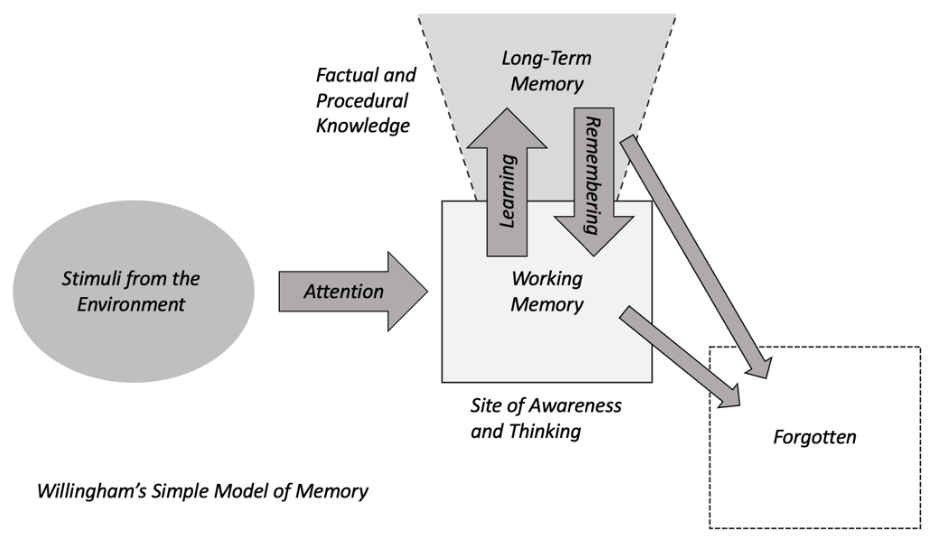
This theory of memory defines the evolution of knowledge, from knowledge which is shared to memory formation. Within this model a stimulus from the environment is recorded through the process of paying attention and is registered within the working memory. Working memory is easily accessed and information can be readily used. At this point the information is only within the working memory. This knowledge will then either be “learnt” and stored within the long term memory or forgotten. It is important to appreciate that not all things which are observed will be learnt. Only the pieces of information which are “used” more frequently while being held in the working memory are more likely to make it to the long-term memory store. Long-term memory is not a permanent store however, and therefore, while in long-term memory things are still likely to be forgotten unless they are regularly recalled back into the working memory. So, in essence, the long-term memory store is just a slower to access but more slowly degrading store of memory.
Our programmes are designed around this, by utilising workshops and seminar style sessions. We do not look to lecture, instead we will utilise resources to engage those which we are working with. By engaging participants prior to sessions, we ensure that within our workshops, every leader has a basis of knowledge within their working memory stores for us to work upon and develop. We can then look to explore, question, and interrogate these concepts and ideas. Moulding and developing them into something which leaders can utilise within their organisation within their day to day practice with their teams. By doing this, we start the process of learning. These reinforced ideas are more likely to make it into the long-term memory stores rather than forgotten.
With our Gold and Platinum packages, the learning cycle continues beyond the single point of “attention and learning”, we look to provide opportunities for ongoing recall and reflection. This is known to reinforce the knowledge learnt and ensures it is recalled and applied to a leaders current practice.
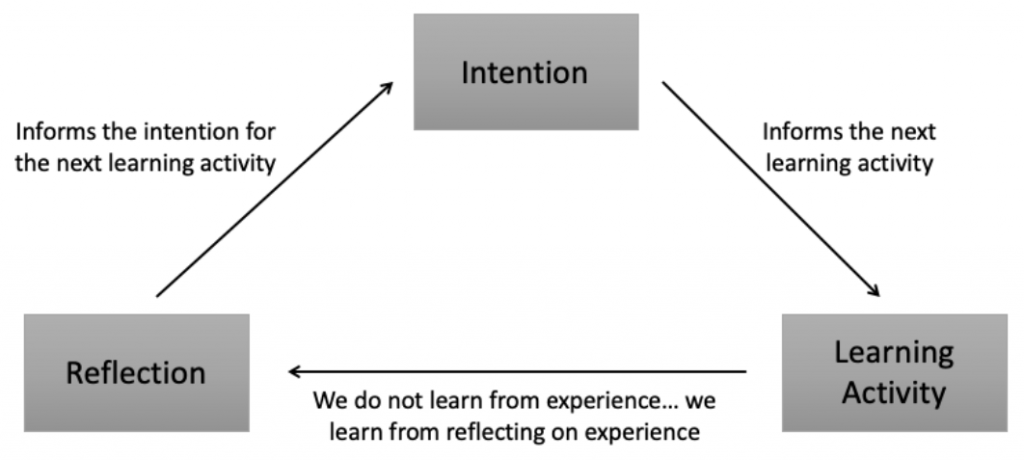
To ensure learning and therefore the retaining of information in the long term, we look to engage in a cycle of intentional practice and reflection (as shown within the diagram above). Journaling has been shown to force reflection and reinforce learning when used within a professional development setting. The concept behind journaling is to provide intentional reflection, this can be considered to inhabit the intersection between internal processing and deep critical reflection (as shown within the diagram below). Only when one takes the time to deeply reflect, critically examining one’s internal thoughts and beliefs, can one truly develop and grow. This is then paired with ongoing one-to-one coaching to explore and provide deep learning which is where new habits can be formed, and internal barriers can be broken down.
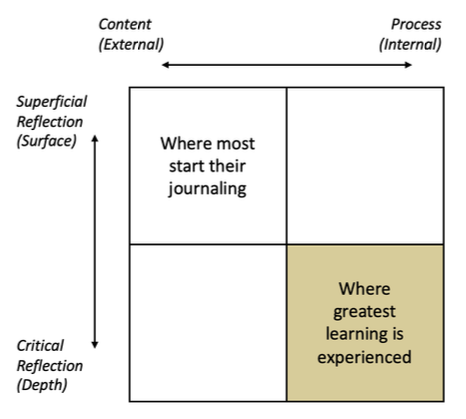
2. Ebbinghaus’ Forgetting Curve and Spaced Learning:
These two theories combined provide one of the most complete theories of learning for maximising memory formation.
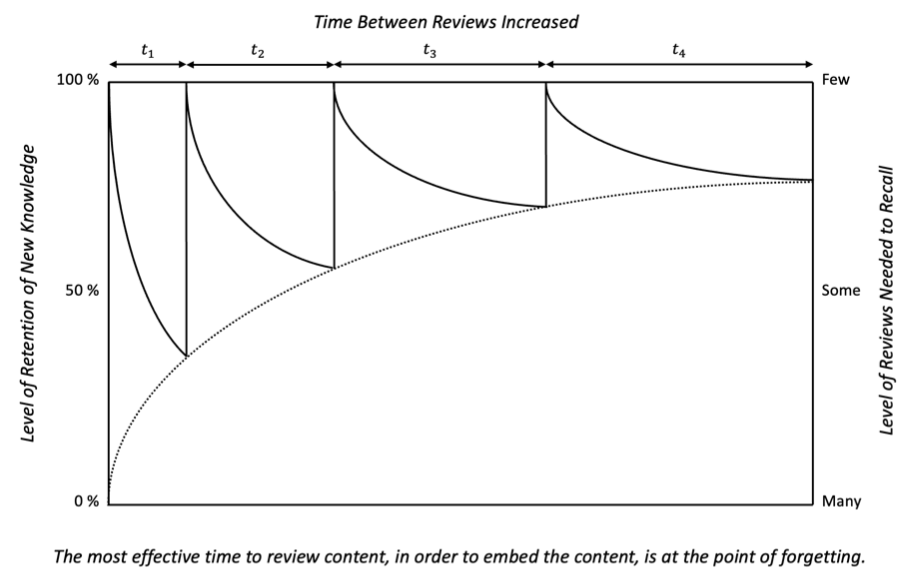
Within this combined model for learning, there is a dashed line showing the level of information retained within the long-term memory store. This is modelled as a percentage of the new knowledge which was learnt in the first instance. The spacing between each review is increased in order to maximise the learning. These reviews work upon Willingham’s Simple Model of Memory as, if the review is positioned at the point of “forgetting” the newly learnt (or even previously reviewed) information, the schema which has been stored in the long-term memory are recalled and reinforced making them more durable and therefore less likely to be forgotten.
Within the Gold and Platinum packages, the refresher sessions spaced throughout the year are an intentional review of the content which was learnt alongside explorations as to how the knowledge and skills have been used, or in some cases not used. Between each review, there are plentiful opportunities for the application of the learnt content, reinforcing the understanding through real-world application. However, the short period initially between the first learning and the first review is there for two primary reasons.
- The rate at which content is forgotten initially is very fast; it is important the review occurs before the critical point of forgetting. There must be residual understanding at the point of review otherwise this is no longer a review but a re-learning which restarts the process all over again.
- If this period is too long, then there is more space for misunderstandings, misconceptions, and misapplication to occur.
Our Gold and Platinum packages combine to ensure this is not the case. Within both packages there is intentionally spaced learning between the follow-up workshops, where we look to increase the periods of time between these. The one-to-one coaching sessions with leaders paired with the drop-in visits looks to help identify any misunderstandings, misconceptions or misapplications which may occur at any point. The Platinum package then adds the ongoing refresher and keep in-touch visits where interventions can then be raised; either individually for additional coaching sessions or for when the next organisational cycle may be needed.
Spaced Recall vs Massed Recall
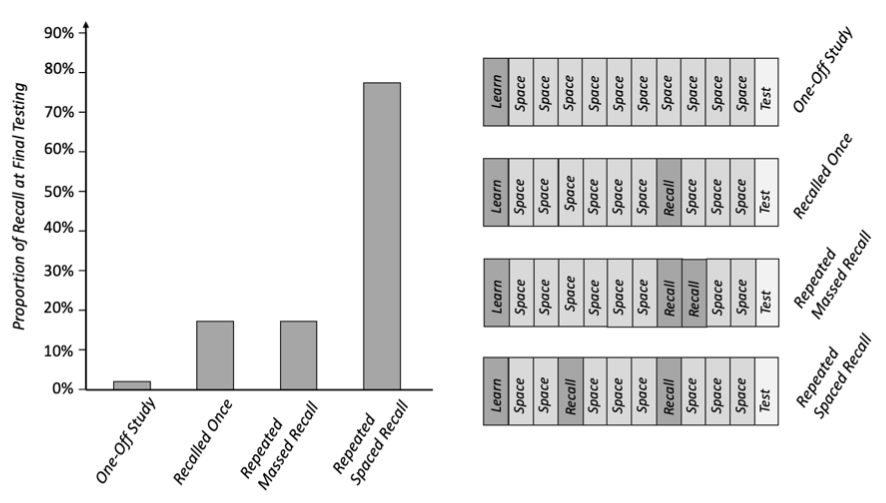
The graph above shows the relative impact of different styles of learning and recall episodes. This is highly important when considering Learning and Development within an organisation as the “test” within the organisation is not a fixed episode, on paper with a pass or fail. The “test” in the organisational setting is the correct application of the learnt knowledge and skills at the moment at which it is required.
What we can see here is that with a one-off session or bulk set of sessions offered as a result of a Learning and Development programme, when we apply the forgetting curve to this, if this is (a) not positioned at a time when the learnt knowledge or skills is applicable and (b) only covered once in a short period of time, by the time the knowledge or skills is applied there is little recall of what was previously covered. As a result, it is likely the employee would claim they rarely apply what is learnt in their organisations Learning and Development, and resort to how they used to do things, their previously learnt and embedded habits. The longer this period between learning and application, the higher the risk of this occurring. This is in fact what has been shown through research, most employees claim their Learning and Development experience to be.
Massed recall occurs where there is a long space between the original learning of the new knowledge and skills and the review or recall. This causes it to no longer be a recall period, and instead a repeated learning period, which does not reinforce knowledge or understanding and instead restarts the process again. This can occur within Learning and Development programmes which are reactionary and look to address issues as and when they arise, the offerings would jump around different content areas and result in lots of different cycles of relearning rather than reinforcement. This intensity of the relearning makes little to no difference; it could be an intense several days or a simple refresher course. What is better, is a repeated period of spaced recall.
Within the Silver package we offer the initial learning period within an intensive Executive Leadership Conference. This is then spaced with on-going workshops within the Gold package and then the refresher workshops within the Platinum package. With the intentional spacing of the workshops, we can maximise the amount of new knowledge and skills which is recalled when needed; at the point of application.
The research has therefore shown that incorporating principles of education into leadership development can lead to increased performance and improved outcomes. Particularly when it comes to opting for our Gold or Platinum packages over our Silver package option. According to a study by Rowold and Heinitz (2007), leadership training programs that are designed like educational interventions, which emphasise learning by doing and reflection, lead to greater self-efficacy and higher transfer of training to the workplace.
Our experience in education also allows us to incorporate innovative teaching and learning strategies into our training and coaching services. For example, we use flipped classroom models to provide pre-work for training sessions, allowing participants to come to training sessions with a basic understanding of the content and facilitating more interactive and engaging discussions.
In addition, our experience in education allows us to develop and deliver training and coaching services that are grounded in evidence-based practices, informing our approach and ensuring that our services are effective and provide a unique and engaging approach to leadership development and team performance. We tailor our services to the specific needs of each organisation and their leaders, incorporating innovative teaching and learning strategies, ensuring our services are evidence-based and grounded in best practices.
With a passion for continuous improvement, innovation and collaboration we have used our expertise to develop what we call the “LAMDA Way”.
The “LAMDA Way”
The “LAMDA way” is an approach which is built on the foundations of cognitive psychology, leadership theory, and coaching best practices. We believe that leadership development is a continuous process that requires a tailored approach for each organisation to be effective, we acknowledge that given the context of each organisation there is no room for a one-size-fits-all solution. Utilising a holistic approach to professional development, we can help leaders, team members, and organisations to succeed. With the unique perspective we are bringing to the sector, LAMDA Solutions is offering a fresh approach to on leadership development, we offer a range of workshop packages and coaching services that can be tailored to each organisation’s unique needs. Our services are designed to address the needs of leaders, team members and the organisation itself.
At the core of the LAMDA way are the foundational principles of “L-E-A-D-E-R” which we believe are essential for effective leadership development. This six-step approach to leadership development stands for: Learn, Experiment, Adapt, Develop, Empower, and Reflect. This approach guides everything we do and allows us to work with organisations and leaders to develop an effective and sustainable leadership culture.
The first principle, Learn, is based on the idea that leaders and team members must continually seek out new knowledge and skills to succeed. Research has shown that a commitment to lifelong learning is essential for effective leadership (Boyer & Associates, 2010). Therefore, the first stage of leadership development must be learning. Leaders must have a strong foundation of knowledge and understanding of leadership concepts, theories, and practices. This basis of knowledge includes understanding the importance and relevance to their leadership practice of emotional intelligence, effective communication, building high-performing teams, time management and productivity, strategic decision-making, coaching and uncertainty, alongside the need for diversity and inclusion. All of which are touched on in our foundational workshop package and built upon with our advanced and evolutionary packages.
The second principle, Experiment, is based on the concept that leaders and team members must be willing to take risks and try new things to achieve success. The concept of experimentation is rooted in the idea of growth mindset, which has been shown to be a key driver of success in various fields (Dweck, 2006). Therefore, this second stage of leadership development must encourage leaders to try new things and experiment with different leadership styles, techniques, and approaches. This involves taking risks, making mistakes, and learning from them. Therefore, a cornerstone of our services involves creating a safe environment where failures are celebrated in the same way as successes, in order to encourage a culture of bravery and courage which is pivotal for growth and development.
The third principle, Adapt, is based on the idea that leaders and team members must be able to adapt to changing circumstances and be flexible in their approach. This concept is grounded in the idea of situational leadership, which argues that there is no one-size-fits-all approach to leadership (Hersey & Blanchard, 1977). Leaders need to develop a skillset which will allow them to be able to adapt to new environments, this includes being open-minded and able to adjust their approach based on the needs of their team and the organisation; especially in times of uncertainty and when facing unforeseen challenges.
The fourth principle, Develop, is based on the concept that leaders and team members must be committed to their own personal and professional growth. Research has shown that a focus on personal development is critical for success in leadership roles (Greenberg, 2013). Leaders need to continually develop their skills, knowledge, and abilities. This involves ongoing learning and development, as well as being open to, and seeking out, feedback and opportunities for coaching as well as setting and reviewing personal development goals.
The fifth principle, Empower, is based on the idea that leaders must empower their team members to take ownership for both their work as well as achieving their goals. This concept is rooted in the idea of servant leadership, which has been shown to be effective in a variety of settings (Greenleaf, 1970). As well as leaders being able to experiment and grow themselves, it is vital that they empower their team members to take ownership of their work, making decisions, and contributing to the success of the organisation. This involves creating a supportive and empowering work environment, where opportunities are provided for both growth and development, and then the contributions of the team members are recognised and rewarded.
The sixth and final principle, Reflect, is based on the concept that leaders and team members must take the time to reflect on their experiences and learn from them. This concept is grounded in the idea of reflective practice, which has been shown to be a key driver of professional development (Schön, 1983). It is vital that leaders reflect not only on their experiences, but look at both their successes and failures, using this reflection to continually improve their leadership practice. This involves taking time to reflect on their leadership style, looking for honest feedback from others and using this to construct an ongoing personal development plan which can restart the cycle of L-E-A-D- E-R again.
We believe that this comprehensive approach to leadership development is essential for building effective leaders and high-performing teams. Building a bespoke package with a holistic approach to leadership development, we are able to work with leaders, team members, and the organisation as a whole to create a culture of continuous learning, growth, and development.
Our approach is based on the latest research in teaching and learning, cognitive psychology, leadership, and coaching. We look to draw on a range of theories and practices, such as Daniel Goleman’s theory of emotional intelligence, John Kotter’s eight-step model of change, and Michael Fullan’s approach to leading change. When applied to the context of the organisation, we can provide a powerful offering which can develop the leadership within the organisation and therefore best prepare the organisation for continued success.
Explore our content further to find out more about who we are and what we stand for.

4 thoughts on “Our Background”
Comments are closed.